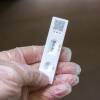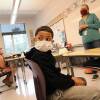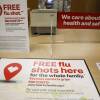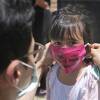With COVID-19 cases rising steeply, some school districts are encouraging masking as many kids return to classes after the holiday break. Boston, Newton, Arlington and Cambridge school districts are all strongly recommending masking in schools through Jan. 13.
In Greater Boston, wastewater detection levels for the virus have practically quadrupled since mid-November, before holiday gatherings and travel started.
“We have been seeing the wastewater data exponentially growing in our community,” said Derrick Neal, chief public health officer at the Cambridge Public Health Department, "and that's an indicator of the level of virus and a level of community spread that's going on. ... And so we want to make sure that we mitigate that spread in school to keep our children as safe as possible.”
Cambridge, like those other districts in the region, is stopping short of requiring masking. Cambridge superintendent Victoria Greer said a mask mandate in her city just didn’t make sense.
“It’s almost like we are requiring young people to mask when there's nowhere else that they have to mask,” Greer said, noting that stores and restaurants no longer require masks. “It's almost like the burden is being placed on public schools to support public health.”
More Education
In Boston, the president of the city’s teachers union, Jessica Tang, said in a statement that they support the district’s decision to recommend masking, but they’re advocating the district and city have a “comprehensive mitigation strategy for January” to stop the spread of COVID-19 and other respiratory diseases.
“Upon our initial review, we feel the new communication [from Boston Public Schools on masking] is a sensible, data-driven policy that is responsive to both public health and also to specific populations for whom masking may be a hardship,” Tang said. “We will be continuing to evaluate and review the policy and its implementation as it proceeds.”
Greer said data in her district, under consultation with the Cambridge Public Health Department, drives their responses to COVID-19.
“What our data shows us is that the majority — actually over 80% — of our staff are fully vaccinated,” said Greer. “We have a high vaccination rate, including the boosters, for our students as well. Additionally, we also have had great compliance with masking from the moment we required it early in the pandemic, up through even prior to the break, people chose to continue to mask and so we did not feel necessarily that our community needed to make it a requirement.”
Greer added that they’ve been distributing free rapid COVID-19 tests, and have seen good use of them and compliance with quarantining when necessary.
“Each community is different,” Greer said. “If we were in a different place where we had either a low vaccination and booster rate, if we had low response when we did have masking in place … we might be at a different decision at this point. But however, based on our past experience, our community is very responsive to our request.”
Neal said in addition to COVID-19, the intense flu season is very concerning, and that “we’re [not] out of the woods yet” with respiratory syncytial virus , known as RSV.
“We've been working behind the scenes during the holidays because we don't have the luxury of not doing anything for a couple of weeks,” said Neal. “We just want to err on the side of caution, because we're going into year three of the COVID-19 pandemic, and we've seen this movie before.”









